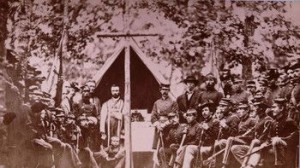 Many Baptists of the South continue displaying inconsistency regarding their heritage of church state separation (despite verbal affirmation). In many ways, the Civil War has led them to take stances foreign to their faith of the past, including advocacy of and loyalty to their nation as a Christian nation that should be governed by biblical teachings, legal observance of Sunday as a holy day, opposition to Sunday mail delivery, exhortations to the government to make demands upon churches in terms of national days of prayer and fasting, and support of government sanctioning of efforts to convert soldiers to Christianity.
Many Baptists of the South continue displaying inconsistency regarding their heritage of church state separation (despite verbal affirmation). In many ways, the Civil War has led them to take stances foreign to their faith of the past, including advocacy of and loyalty to their nation as a Christian nation that should be governed by biblical teachings, legal observance of Sunday as a holy day, opposition to Sunday mail delivery, exhortations to the government to make demands upon churches in terms of national days of prayer and fasting, and support of government sanctioning of efforts to convert soldiers to Christianity.
But on at least one church state issue, most Confederate Baptists maintain a traditional stance: resistance to the use of government money to salary military chaplains.
A current commentary now circulating among Georgia Baptists via the Christian Index outlines one Baptist’s reasons why those of his faith should oppose government-salaried chaplains, despite a shortage of Baptist chaplains in the Confederate army.
Brother Boykin–I have been reflecting a great deal for some time past, with regard to the course that we ought to pursue, as Baptists, relative to furnishing our army with the living ministry.
I must say that I am conscientiously opposed to the civil authorities having any thing to do with appointing or supporting chaplains. Of course, I believe that the government should give its approbation to the preaching of the gospel to the soldiers; but, at the same time, leave the furnishing of the army with chaplains and their support to the churches.
My opinion arises,
First–Because the system is without an example in the Word of God, and contrary to the teachings of Christ and his apostles. If so, it must be an evil.
Secondly–Because it savors of the union of church and State. Hence, tends to persecution.
Thirdly–Because it begets inactivity and passimony upon the part of the churches.–“If the government will support the ministry why need the churches be troubled about the matter?” And so it is, the burden is shifted, and thrown where it ought never to have been.
Fourthly–Because we are forced by taxation to sustain men in whom we have no confidence; and also, to sustain men of other denominations who preach such doctrines which we believe to be directly opposed to the teachings of Christ.
Fifthly–Because by this system, the ministry has been dishonored. Men of doubtful moral character–men who could not get an audience where they are best known, have sought and obtained the position of chaplain for for the sake of filthy lucre. “But it is happened unto them according to the true proverb, the dog is turned to his own vomit again; and the sow that was washed to her wallowing in the mire.”
Sixthly, and lastly–I am opposed to the system, because it is, in spirit, contrary to the great principle for which Baptists have always and everywhere, contended, viz: Liberty.
If the position which I have taken, together with the objections raised be correct, we come to at least two conclusions.
1. Let the last Baptist minister who holds a commission from the government resign. The question may then be asked–“Are the Baptists to share some of the glory of preaching the gospel to our brave soldiers? Are they to have no part in this great work?” Yes, and and the most successful part.
2. Let the Baptists of the Confederate States open wide their hearts and purses, and let men be selected of the right stamp–godly men–to go forth as missionaries to sow the precious seed of eternal life in our army. True, we have a few missionaries laboring among our soldiers–but the supply is nothing like equal to the demand–and, perhaps, the condition of our treasury will not admit more laborers into the field than we already have. This being the case, let the pastors of the churches bring this subject to bear upon the minds of their membership; and as no true christian can refuse to give to such a cause, and that cheerfully and liberally, may we not expect that the amount of money sent up to the Convention will be much greater than usual? This being the case, the number of missionaries may be increased–and the work of the Lord will prosper in the hands of His servants.
Yours truly,
J. G. Johnson
Much will be the hand-wringing over the lack of Confederate Baptist chaplains and missionaries throughout the remainder of the war, and many will be the criticisms of Baptist churches and pastors of the South for not doing enough to support the preaching of the gospel among Confederate soldiers.
Source: J. G. Johnson, “Chaplains,” Christian Index, May 18, 1863


